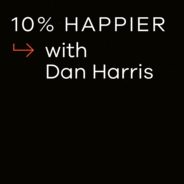In this episode we're talking about how what you believe— about yourself, or about the world — can become a self-fulfilling prophecy. So if you believe the world is a cold and unforgiving place, it can become that way. And if you believe that you have limited capacities for kindness, you can, in effect, make it so. Our guest is Jamil Zaki, who is making his second appearance here on the show. Jamil is a professor of psychology at Stanford University and the director of the Stanford Social Neuroscience Lab. He is a leading expert on empathy and the author of the book The War for Kindness. Jamil discusses three levels of kindness: kindness toward ourselves, kindness in our close relationships, and kindness in our communities. He argues that starting with the self is critical, but also that the kinder we can make our communities, the kinder we will be ourselves. And the more we reorient ourselves to focus on the positive, the more we can create a self-fulfilling prophecy of kindness. We are bringing you this Ten Percent Happier podcast series in collaboration with the Apple TV+ Original Series Ted Lasso because kindness is a huge theme in the show, and there are many practical lessons embedded right in the plot. Watch Season 2 of Ted Lasso on Apple TV+. Subscription required. Apple TV+ and/or select content may not be available in all regions. To sign up for the Ted Lasso Challenge, download the Ten Percent Happier app today: https://10percenthappier.app.link/install Full Shownotes: https://www.tenpercent.com/podcast-episode/jamil-zaki-375

Gesundheit, Wellness & BeautyLeben & Liebe
10% Happier with Dan Harris Folgen
Self-help for smart people. World-class insights and practices from experts in modern science and ancient wisdom. Hosted by veteran journalist and best-selling author, Dan Harris.
Folgen von 10% Happier with Dan Harris
947 Folgen
-
Folge vom 01.09.2021Reversing the Golden Rule | Jamil Zaki
-
Folge vom 30.08.2021The Evolutionary Case for Kindness | Dacher KeltnerHere's a question: Is there an evolutionary advantage to being kind? Our guest today is Dacher Keltner, an eminent scientist who will make the case that, contrary to popular conceptions of evolution (dog-eat-dog, survival of the fittest), and contrary to a lot of what we see on the news, our species is actually uniquely wired for kindness and compassion. Dacher Keltner is the Director of the Social Interaction Lab at the University of California at Berkeley, the Faculty Director of the Berkeley Greater Good Science Center, and the author of the book Born to Be Good: The Science of a Meaningful Life. In this episode, we talk about Darwin's perspective on human sympathy and selfishness, where he stands on the question of Original Sin versus Buddha Nature, the importance of touch when it comes to communicating compassion, and the relationship between teasing and kindness. We are bringing you this Ten Percent Happier podcast series in collaboration with the Apple TV+ Original Series Ted Lasso because kindness is a huge theme in the show, and there are many practical lessons embedded right in the plot. Watch Season 2 of Ted Lasso on Apple TV+. Subscription required. Apple TV+ and/or select content may not be available in all regions. Download the Ten Percent Happier app today: https://10percenthappier.app.link/install Full Shownotes: https://www.tenpercent.com/podcast-episode/dacher-keltner-374
-
Folge vom 25.08.2021Optimizing Your Stress | Modupe AkinolaStress – which many of us despise and try to avoid – does not actually have to be a bad thing. Rather, it's our relationship to stress, our mindset about stress, that determines whether we are helped or harmed by it. Today's guest has the science to back this up and the practical tools to help you transfer her insights from the lab to your life. Modupe Akinola is an Associate Professor of Management at the Columbia Business School and host of the TED Business podcast. She is also one of the featured experts in our Stress Better course in the Ten Percent Happier app. In this conversation, Modupe talks about what she's learned during these extraordinarily stressful last couple of years, what she calls the "stress mindset" (and how to cultivate it), and the vast resources available to us for handling stress (and how to tap them). We also dive into another of Modupe's areas of expertise: how to have productive conversations around the often stressful–but critical–issues of diversity, equity, and inclusion. Get ready for the upcoming Ted Lasso Challenge by downloading the Ten Percent Happier app today: https://10percenthappier.app.link/install Full Shownotes: https://www.tenpercent.com/podcast-episode/modupe-akinola-373
-
Folge vom 23.08.2021The Science of Making and Keeping Friends | Robin DunbarFriendship might not necessarily be something you've considered to be an urgent psychological and physiological issue. On this show, we spend a lot of time exploring how the quality of our relationships determines the quality of our lives and our health. Sadly, in many ways, it's harder than ever to make and keep friends. With loneliness and disconnection on the rise, it's clear that our society just wasn't constructed for social connection. And recent data suggests we're in a friendship crisis, with many of us reporting that we have fewer close friendships than ever. Our guest today is Robin Dunbar, an Emeritus Professor of Evolutionary Psychology at Oxford University and the author of numerous books on the development of Homo sapiens. Dunbar is perhaps best known for formulating "Dunbar's number," which is a measurement of the number of relationships our brain is capable of maintaining at any one time. He is a world-renowned expert on human relationships, and has a ton of fascinating research findings and practical tips for upping your friendship game. In this conversation, we dive into the science behind human relationships, the upsides and downsides of maintaining friendships on social media, the viability of friendships across gender lines, and what science says you can do to compensate if you feel you are currently lacking in close friendships. Download the Ten Percent Happier app today: https://10percenthappier.app.link/install Full Shownotes: https://www.tenpercent.com/podcast-episode/robin-dunbar-372
